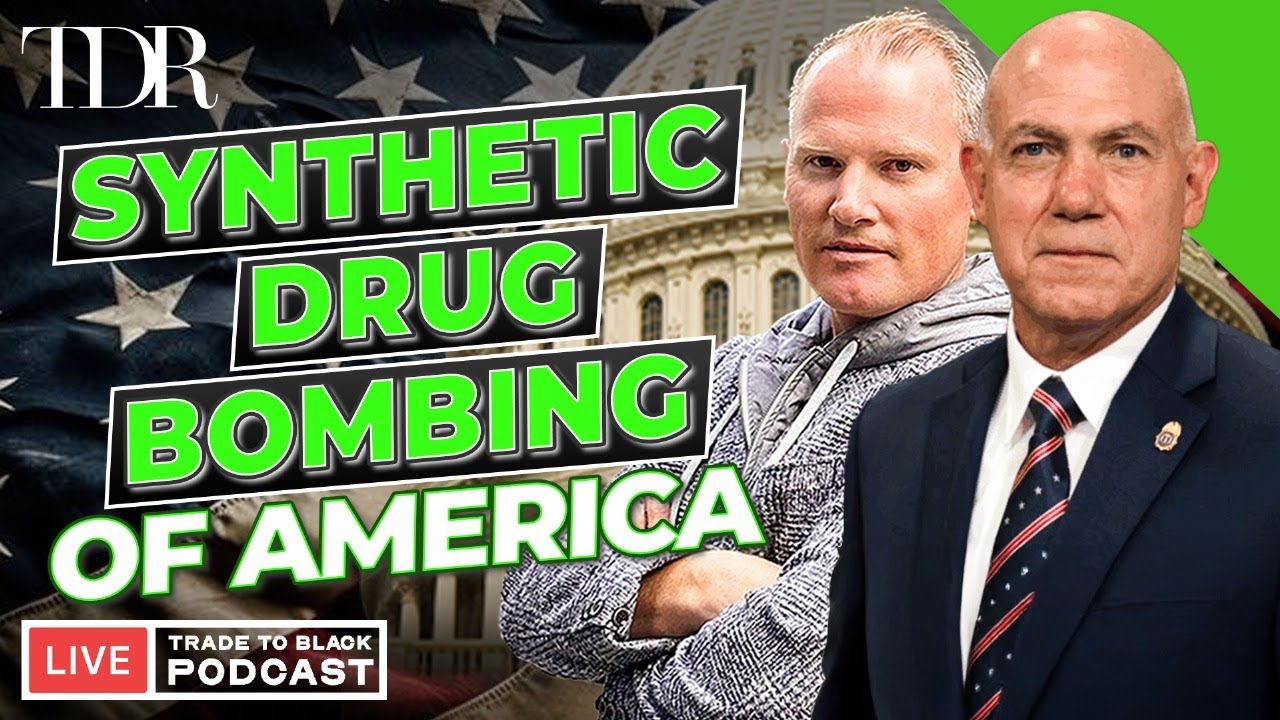Politics
Trump’s Former DEA Head Predicts President Will ‘Dig In’ To Marijuana Laws And Figure Out ‘Best Way Forward’

President Donald Trump’s former acting head of the Drug Enforcement Administration (DEA) is predicting that the administration will soon “dig in” to the state-federal marijuana policy conflict, emphasizing the need to “eliminate confusion, not create it” amid the rescheduling process.
In a somewhat surprising interview appearance on the cannabis-focused podcast The Dales Report on Friday, former DEA Acting Administrator Derek Maltz stressed that he didn’t want to “start second-guessing” current officials by taking a personal position on rescheduling—but he reiterated his previously articulated claim that the push for reform under the Biden administration was politically, rather than scientifically, motivated.
Maltz—who retired from DEA in 2014 after 28 years of service and subsequently served four months as the agency’s interim leader under Trump earlier this year—made it clear throughout the conversation that he didn’t want to make any definitive statements about where he stands on the proposal to move marijuana from Schedule I to Schedule III of the Controlled Substances Act (CSA).
And while he echoed points he’s made in the past about the potential harms of cannabis use, linking it to psychosis and schizophrenia and stressing the need to prevent youth access, he did seem to an extent to distinguish between products available in regulated state markets and those sold illegally by illicit Chinese and Mexican networks that he says are “weaponizing the use of drugs” and contaminating cannabis with pesticides and other synthetic additives.
Cartels have “expanded their role with all the synthetic chemicals, and of course with these marijuana grow operations all over the country,” he said. “It’s very alarming.”
“What I’m talking about here is 100 percent on the illicit manufacturing of marijuana, and, of course, these other chemicals. I’m not an expert on the regulations and the issues with legal marijuana in different states,” Maltz said. “You know, we all have our opinions on that, but I’m not here to discuss my opinion. I’m here to give your audience the facts of the poisoning of our country with these criminal networks.”
“It’s beyond scary to me, because I have kids, right? I have a granddaughter. And it’s just the messaging is really bad—like in this whole discussion on the whole marijuana,” he said. “I hope they can get some professionals to have real discussions about it, actually go through it, and not just winging it.”
While reluctant to get into specifics around the rescheduling process—which has stalled out amid complications with DEA administrative hearings and the departure of an administrative law judge (ALJ) who was overseeing the case—Maltz did reiterate that he feels the Biden administration politicized the issue.
“In my opinion, as a citizen of America who’s been fighting to save lives for many years, the previous administration was using politics over public safety the way they handled that,” he said. “I’m not saying [that] about legalizing or rescheduling—just the way they did it was unprecedented, and I can see how it caused the response that it did.
“Again, I wasn’t in the DEA when this happened, but I saw a lot of nasty, rotten decisions that were made, putting politics ahead of public safety. And that’s something I can’t tolerate,” he said.
Before the end of the interview, Maltz emphasized that he feels leaders should strive to “eliminate confusion, not create it.”
“So what does that mean? If marijuana in America is illegal in the federal system, and then we have the states running wild and legalizing it, that’s causing massive confusion,” he said. “So I’m confident that President Trump and his administration will actually dig into this issue from top to bottom, from left to right, and figure out what the best way forward is, using all the experts in these different agencies.”
“But what I don’t like is just this confusion and misinformation. That’s not good for anybody,” he said. “The marijuana today that’s out there on the streets, that’s being smoked by these kids that’s very cheap is causing really bad damage to their brains.”
Pressed again on rescheduling, Maltz said he’s “not going to answer it, because the DEA is responsible for that within the government.”
“I’m not one of these guys sitting on the sideline that’s going to start second-guessing. I don’t have the deep expertise in what it actually requires,” he said. “What I would say is that, in my humble opinion, if you’re going to evaluate this stuff in great detail, you have to talk to the professionals that are out there that have all sides of the story, because it has evolved. It’s very, very complicated.”
“In my world, just the fact that people are being rushed to the emergency rooms, I would like to know how many of those people bought from a legal dispensary. However, what I would say, and you would know better than me, out there in America, there have been cases of tainted pot that’s being sold in the legal dispensaries that’s coming from these illicit operations. So I mean, this is all a loophole that would have to be shut down. But again, I’ll leave that question up to the active administration personnel.”
“I know this is a hot topic. So I’m sure something will come out over the next several months,” he said.
“In the marijuana industry, regardless of what you believe in—and I don’t really care, my opinion doesn’t matter,” he said. “What matters is right now, in America, people are getting very sick from smoking these Chinese marijuana plants, and I don’t know what the hell is in them. So I hope the government can do good analysis and studies of what kind of chemical chemicals are in these plants and use that to really come up with better strategies.”
“What I’m talking about is the focus on the transnational criminal networks—coming together on that issue. Of course, in the marijuana rescheduling process or legalization process, whatever you want to say, it’s going to require other agencies like [the U.S. Department of Health and Human Services, or HHS] obviously and the scientists that are out there throughout the government that work with the DEA—professionals to figure it out on the medical side. But again, what I’m talking about on your show, I’m specifically focused on the illicit networks that are destroying our country. And so there are two different approaches. I’m hoping that the best and brightest from the the pertinent agencies come together and have the discussions on this process, so we’ll see how that goes.”
Meanwhile, Terrence Cole, who was sworn in last month as the new administrator of the DEA, declined to include rescheduling on a list of “strategic priorities” the agency that instead focused on anti-trafficking enforcement, Mexican cartels, the fentanyl supply chain, drug-fueled violence, cryptocurrency, the dark web and a host of other matters.
That’s despite the fact that Cole said during a confirmation hearing in April that examining the government’s pending marijuana rescheduling proposal would be “one of my first priorities” after taking office.
Ahead of Cole’s swearing-in on Wednesday, the Senate a day earlier gave final approval to the Trump nominee. Almost immediately afterward, a major marijuana industry association renewed the push to make progress on the long-stalled federal cannabis rescheduling process.
Notably, however, while Cole has said that examining the rescheduling proposal would be “one of my first priorities” if he was confirmed, he has so far refused to say what he wants the result to be—and has made past comments expressing concerns about the health effects of cannabis.
Last month, meanwhile, DEA again notified an agency judge that the marijuana rescheduling process remains stalled under the Trump administration.
—
Marijuana Moment is tracking hundreds of cannabis, psychedelics and drug policy bills in state legislatures and Congress this year. Patreon supporters pledging at least $25/month get access to our interactive maps, charts and hearing calendar so they don’t miss any developments.
![]()
Learn more about our marijuana bill tracker and become a supporter on Patreon to get access.
—
It’s been six months since DEA ALJ John Mulrooney temporarily paused hearings on a proposal to move cannabis from Schedule I to Schedule III of the Controlled Substances Act (CSA) that was initiated under the Biden administration. And in a joint report to the judge submitted on Monday, DEA attorneys and rescheduling proponents said they’re still at an impasse.
Mulrooney—who announced his retirement last week, leaving the rescheduling process entirely to Cole—initially agreed to delay the proceedings after several pro-reform parties requested a leave to file an interlocutory appeal amid allegations that certain DEA officials conspired with anti-rescheduling witnesses who were selected for the hearing.
The rescheduling proceedings have generated significant public interest. While moving marijuana to Schedule III wouldn’t federally legalize it, the reform would free up licensed cannabis businesses to take federal tax deductions and remove certain research barriers.
Meanwhile, two GOP senators introduced a bill in February that would continue to block marijuana businesses from taking federal tax deductions under Internal Revenue Service (IRS) code 280E—even if it’s ultimately rescheduled.
A survey conducted by a GOP pollster affiliated with Trump that was released in April found that a majority of Republicans back a variety of cannabis reforms, including rescheduling. And, notably, they’re even more supportive of allowing states to legalize marijuana without federal interference compared to the average voter.
Trump picked former Florida Attorney General Pam Bondi (R) to run DOJ, and the Senate confirmed that choice. During her confirmation hearings, Bondi declined to say how she planned to navigate key marijuana policy issues. And as state attorney general, she opposed efforts to legalize medical cannabis.
Amid the stalled marijuana rescheduling process that’s carried over from the last presidential administration, congressional researchers recently reiterated that lawmakers could enact the reform themselves with “greater speed and flexibility” if they so choose, while potentially avoiding judicial challenges.
A newly formed coalition of professional athletes and entertainers, led by retired boxer Mike Tyson, also sent a letter to Trump earlier this month—thanking him for past clemency actions while emphasizing the opportunity he has to best former President Joe Biden by rescheduling marijuana, expanding pardons and freeing up banking services for licensed cannabis businesses.
Photo courtesy of Philip Steffan.




